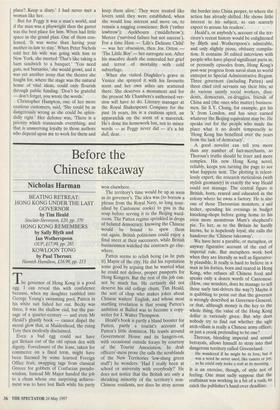Before the Chinese takeaway
Nicholas Harman BEATING RETREAT: HONG KONG UNDER THE LAST GOVERNOR by Tim Heald Sinclair-Stevenson, £20, pp. 370 HONG KONG REMEMBERS by Sally Blyth and Ian Wotherspoon OUP, £1799, pp. 285 KOWLOON TONG by Paul Theroux Hamish Hamilton, £16.99, pp. 213 The governor of Hong Kong is a good egg. I can reveal this with confidence because, when my daughter tumbled into George Young's swimming pool, Patten in his white suit fished her out. Becky was three, it was the shallow end, but the pas- sage of a quarter-century — and even Mr Heald's ghastly book — cannot dispel the moral glow that, at Maidenhead, the rising Tory then modestly disclaimed.
Even a bad egg could not have got Britain out of the old opium den with dignity. Foreclosure of the lease, taken for commerce on a fixed term, might have been finessed by some learned Foreign Office fruit, swapping tags from classical Greece for gobbets of Confucian pseudo- wisdom. Instead Mr Major handed the job to a chum whose one surprising achieve- ment was to have lost Bath while his party won elsewhere.
The territory's time would be up as soon as its governor's. The idea was (to borrow a phrase from the Royal Navy, so long nour- ished by Cantonese cooks) to piss in the soup before serving it to the Beijing ward- room. The Patten regime sprinkled in drops of belated democracy, knowing the Chinese would be bound to spew them out again. British politicians could enjoy a final sneer at their successors, while British businessmen watched the contracts go else- where.
Patten seems to relish being (as he puts it) Mayor of the city. He did his reputation some good by arguing that he wanted what he could not deliver, proper passports for Hong Kongers. But the rest of the job can- not be much fun. He certainly did not deserve his old college chum, Tim Heald, the sort of chap who makes jokes about Chinese waiters' English, and whose most startling revelation is that young Patten's ambition at Balliol was to become a copy- writer for J. Walter Thompson. Heald's book is partly a bland booster for Patten, partly a tourist's account of Patten's little dominion. He trawls around Government House and its hangers-on, with occasional outside forays by courtesy of the Tourist Association. In drab officers'-mess prose (he calls the scrublands of the New Territories low-slung green stuff') he wonders: 'Had I really been at school or university with everybody?' He does not notice that the British are only a shrinking minority of the territory's non- Chinese residents, nor does he stray across the border into China proper, to where the action has already shifted. He shows little interest in his subject, so can scarcely expect to arouse his readers'.
Heald's, or anybody's, account of the ter- ritory's recent history would be enlightened by Blyth and Wotherspoon's admirable, and only slightly pious, obituary compila- tion. It contains 30 edited interviews with people who have played significant parts in, or personify episodes from, Hong Kong's post-war progress from naval slum to world entrepot to Special Administrative Region. Three governors (including Patten) and three chief civil servants say their bits; so do various saintly social workers, dissi- dents, democrats, ex-druggies, friends of China and (the ones who matter) business- men. Sir S.Y. Chung, for example, got his I' from London, and has since earned whatever the Beijing equivalent may be. He speaks out for the people who made the place what it no doubt temporarily is: 'Hong Kong has benefited over the years from the lack of democracy'.
A good novelist can tell you more than any number of fact-merchants, so Thermix's truths should be truer and more complex. His new Hong Kong novel, reliably, keeps you turning the page to see what happens next. The plotting is relent- lessly expert, the research meticulous (with stylish geomancy) in exactly the way Heald could not manage. The central figure is British, born, reared and educated in the colony where he owns a factory. He is also one of those Therouvian monsters, a sad lecher, spending his evenings in budget knocking-shops before going home to his even more monstrous Mum's shepherd's pie. To her, as to the Britain he hardly knows, he is hopelessly loyal; she calls the handover the 'Chinese takeaway'.
We have here a parable, or metaphor, or anyway figurative account of the end of imperial rule. But metaphors work best when they are literally as well as figurative- ly plausible. It really is hard to believe in a man in his forties, born and reared in Hong Kong, who refuses all Chinese food and speaks only a dozen words of Cantonese. (How, one wonders, does he manage to tell those surly taxi-drivers the way?) Maybe it is quibbling to point out that the governor is wrongly described as Governor-General, or that, although money is the key to the whole thing, the value of the Hong Kong dollar is variously given. But why does nobody try to find out whether the ugly arch-villain is really a Chinese army officer, or just a crook pretending to be one? Theroux, blending imperial and sexual betrayals, allows himself to stray into that dangerous territory called Greeneland:
He wondered if he might be in love, but it
was a word he never used, like cancer or joy, so he could only make a stab at its meaning. It is an exercise, though, of style not of feeling. One must sadly suppose that the craftsman was working in a bit of a rush, to catch the publisher's hand-over deadline.


























































 Previous page
Previous page